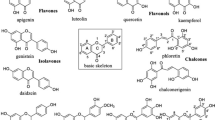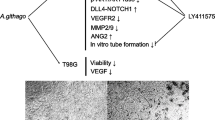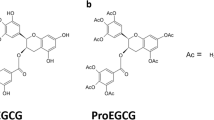Abstract
Previous studies indicate that green tea extract may inhibit breast cancer progression by blocking angiogenesis, although the molecular mechanisms are not well defined. We demonstrate that administration of Polyphenon E (Poly E), a standardized green tea extract, inhibited MDA-MB231 breast cancer and human dermal microvascular endothelial (HMVEC) cell migration and the expression of vascular endothelial growth factor (VEGF) and matrix metalloproteinase 9 (MMP9). In addition, Poly E inhibited VEGF-induced neovascularization in vivo. We also demonstrate that Poly E blocked signal transducers and activators of transcription (STAT) signaling by suppressing interferon-gamma (IFN-γ)-induced gene transcription via IFN-γ-activating sequence (GAS) elements and downstream STAT3 activation by inhibiting STAT1 and STAT3 dimerization in MDA-MB231 cells. Transient expression of constitutively active STAT3 significantly reduced the inhibitory effect of Poly E on cell migration and VEGF and MMP9 expression. Taken together, these observations indicate that green tea extract inhibits angiogenesis partly through the disruption of STAT3-mediated transcription of genes, including VEGF.








Similar content being viewed by others
References
Folkman J (1995) Angiogenesis in cancer, vascular, rheumatoid and other disease. Nat Med 1:27–31. doi:10.1038/nm0195-27
Atiqur Rahman M, Toi M (2003) Anti-angiogenic therapy in breast cancer. Biomed Pharmacother 57:463–470. doi:10.1016/j.biopha.2003.09.009
Rosen LS (2005) VEGF-targeted therapy: therapeutic potential and recent advances. Oncologist 10:382–391. doi:10.1634/theoncologist.10-6-382
Guidi AJ, Schnitt SJ, Fischer L, Tognazzi K, Harris JR, Dvorak HF, Brown LF (1997) Vascular permeability factor (vascular endothelial growth factor) expression and angiogenesis in patients with ductal carcinoma in situ of the breast. Cancer 80:1945–1953. doi:10.1002/(SICI)1097-0142(19971115)80:10<1945::AID-CNCR11>3.0.CO;2-Y
Foekens JA, Peters HA, Grebenchtchikov N, Look MP, Meijer-van Gelder ME, Geurts-Moespot A, van der Kwast TH, Sweep CG, Klijn JG (2001) High tumor levels of vascular endothelial growth factor predict poor response to systemic therapy in advanced breast cancer. Cancer Res 61:5407–5414
Thomas AL, Morgan B, Drevs J, Unger C, Wiedenmann B, Vanhoefer U, Laurent D, Dugan M, Steward WP (2003) Vascular endothelial growth factor receptor tyrosine kinase inhibitors: PTK787/ZK 222584. Semin Oncol 30:32–38
Singh RP, Sharma G, Dhanalakshmi S, Agarwal C, Agarwal R (2003) Suppression of advanced human prostate tumor growth in athymic mice by silibinin feeding is associated with reduced cell proliferation, increased apoptosis, and inhibition of angiogenesis. Cancer Epidemiol Biomarkers Prev 12:933–939
Arbiser JL, Klauber N, Rohan R, van Leeuwen R, Huang MT, Fisher C, Flynn E, Byers HR (1998) Curcumin is an in vivo inhibitor of angiogenesis. Mol Med 4:376–383
Kim EC, Min JK, Kim TY, Lee SJ, Yang HO, Han S, Kim YM, Kwon YG (2005) [6]-Gingerol, a pungent ingredient of ginger, inhibits angiogenesis in vitro and in vivo. Biochem Biophys Res Commun 335:300–308. doi:10.1016/j.bbrc.2005.07.076
Park JS, Kim MH, Chang HJ, Kim KM, Kim SM, Shin BA, Ahn BW, Jung YD (2006) Epigallocatechin-3-gallate inhibits the PDGF-induced VEGF expression in human vascular smooth muscle cells via blocking PDGF receptor and Erk-1/2. Int J Oncol 29:1247–1252
Rosen LS (2002) Clinical experience with angiogenesis signaling inhibitors: focus on vascular endothelial growth factor (VEGF) blockers. Cancer Control 9:36–44
Fassina G, Vene R, Morini M, Minghelli S, Benelli R, Noonan DM, Albini A (2004) Mechanisms of inhibition of tumor angiogenesis and vascular tumor growth by epigallocatechin-3-gallate. Clin Cancer Res 10:4865–4873. doi:10.1158/1078-0432.CCR-03-0672
Yang CS, Maliakal P, Meng X (2002) Inhibition of carcinogenesis by tea. Annu Rev Pharmacol Toxicol 42:25–54. doi:10.1146/annurev.pharmtox.42.082101.154309
Masuda M, Suzui M, Lim JT, Weinstein IB (2003) Epigallocatechin-3-gallate inhibits activation of HER-2/neu and downstream signaling pathways in human head and neck and breast carcinoma cells. Clin Cancer Res 9:3486–3491
Fujiki H, Suganuma M, Kurusu M, Okabe S, Imayoshi Y, Taniguchi S, Yoshida T (2003) New TNF-alpha releasing inhibitors as cancer preventive agents from traditional herbal medicine and combination cancer prevention study with EGCG and sulindac or tamoxifen. Mutat Res 523–524:119–125. doi:10.1016/S0027-5107(02)00327-5
Bettuzzi S, Brausi M, Rizzi F, Castagnetti G, Peracchia G, Corti A (2006) Chemoprevention of human prostate cancer by oral administration of green tea catechins in volunteers with high-grade prostate intraepithelial neoplasia: a preliminary report from a one-year proof-of-principle study. Cancer Res 66:1234–1240. doi:10.1158/0008-5472.CAN-05-1145
Clark J, You M (2006) Chemoprevention of lung cancer by tea. Mol Nutr Food Res 50:144–151. doi:10.1002/mnfr.200500135
Sun CL, Yuan JM, Koh WP, Yu MC (2006) Green tea, black tea and breast cancer risk: a meta-analysis of epidemiological studies. Carcinogenesis 27:1310–1315. doi:10.1093/carcin/bgi276
Tang FY, Meydani M (2001) Green tea catechins and vitamin E inhibit angiogenesis of human microvascular endothelial cells through suppression of IL-8 production. Nutr Cancer 41:119–125. doi:10.1207/S15327914NC41-1&2_17
Lamy S, Gingras D, Beliveau R (2002) Green tea catechins inhibit vascular endothelial growth factor receptor phosphorylation. Cancer Res 62:381–385
Masuda M, Suzui M, Lim JT, Deguchi A, Soh JW, Weinstein IB (2002) Epigallocatechin-3-gallate decreases VEGF production in head and neck and breast carcinoma cells by inhibiting EGFR-related pathways of signal transduction. J Exp Ther Oncol 2:350–359. doi:10.1046/j.1359-4117.2002.01062.x
Kojima-Yuasa A, Hua JJ, Kennedy DO, Matsui-Yuasa I (2003) Green tea extract inhibits angiogenesis of human umbilical vein endothelial cells through reduction of expression of VEGF receptors. Life Sci 73:1299–1313. doi:10.1016/S0024-3205(03)00424-7
Tang FY, Nguyen N, Meydani M (2003) Green tea catechins inhibit VEGF-induced angiogenesis in vitro through suppression of VE-cadherin phosphorylation and inactivation of Akt molecule. Int J Cancer 106:871–878. doi:10.1002/ijc.11325
Garbisa S, Sartor L, Biggin S, Salvato B, Benelli R, Albini A (2001) Tumor gelatinases and invasion inhibited by the green tea flavanol epigallocatechin-3-gallate. Cancer 91:822–832. doi:10.1002/1097-0142(20010215)91:4<822::AID-CNCR1070>3.0.CO;2-G
Rodriguez SK, Guo W, Liu L, Band MA, Paulson EK, Meydani M (2006) Green tea catechin, epigallocatechin-3-gallate, inhibits vascular endothelial growth factor angiogenic signaling by disrupting the formation of a receptor complex. Int J Cancer 118:1635–1644. doi:10.1002/ijc.21545
Bromberg JF, Wrzeszczynska MH, Devgan G, Zhao Y, Pestell RG, Albanese C, Darnell JE Jr (1999) Stat3 as an oncogene. Cell 98:295–303. doi:10.1016/S0092-8674(00)81959-5
Leong H, Sloan JR, Nash PD, Greene GL (2005) Recruitment of histone deacetylase 4 to the N-terminal region of estrogen receptor alpha. Mol Endocrinol 19:2930–2942. doi:10.1210/me.2005-0178
Leong H, Mathur P, Greene G (2007) Inhibition of mammary tumorigenesis in the C3(1)/SV40 mouse model by green tea. Breast Cancer Res Treat 107(3):359–369
Clevenger CV (2004) Roles and regulation of stat family transcription factors in human breast cancer. Am J Pathol 165:1449–1460
Haura EB, Turkson J, Jove R (2005) Mechanisms of disease: insights into the emerging role of signal transducers and activators of transcription in cancer. Nat Clin Pract Oncol 2:315–324. doi:10.1038/ncponc0195
Brierley MM, Fish EN (2005) Stats: multifaceted regulators of transcription. J Interferon Cytokine Res 25:733–744. doi:10.1089/jir.2005.25.733
Sartippour MR, Shao ZM, Heber D, Beatty P, Zhang L, Liu C, Ellis L, Liu W, Go VL, Brooks MN (2002) Green tea inhibits vascular endothelial growth factor (VEGF) induction in human breast cancer cells. J Nutr 132:2307–2311
Kondo T, Ohta T, Igura K, Hara Y, Kaji K (2002) Tea catechins inhibit angiogenesis in vitro, measured by human endothelial cell growth, migration and tube formation, through inhibition of VEGF receptor binding. Cancer Lett 180:139–144. doi:10.1016/S0304-3835(02)00007-1
Jung YD, Kim MS, Shin BA, Chay KO, Ahn BW, Liu W, Bucana CD, Gallick GE, Ellis LM (2001) EGCG, a major component of green tea, inhibits tumour growth by inhibiting VEGF induction in human colon carcinoma cells. Br J Cancer 84:844–850. doi:10.1054/bjoc.2000.1691
Heinrich PC, Behrmann I, Haan S, Hermanns HM, Muller-Newen G, Schaper F (2003) Principles of interleukin (IL)-6-type cytokine signalling and its regulation. Biochem J 374:1–20. doi:10.1042/BJ20030407
Kubo M, Hanada T, Yoshimura A (2003) Suppressors of cytokine signaling and immunity. Nat Immunol 4:1169–1176. doi:10.1038/ni1012
Yu H, Jove R (2004) The STATs of cancer—new molecular targets come of age. Nat Rev Cancer 4:97–105. doi:10.1038/nrc1275
Buettner R, Mora LB, Jove R (2002) Activated STAT signaling in human tumors provides novel molecular targets for therapeutic intervention. Clin Cancer Res 8:945–954
Kortylewski M, Jove R, Yu H (2005) Targeting STAT3 affects melanoma on multiple fronts. Cancer Metastasis Rev 24:315–327. doi:10.1007/s10555-005-1580-1
Alvarez JV, Febbo PG, Ramaswamy S, Loda M, Richardson A, Frank DA (2005) Identification of a genetic signature of activated signal transducer and activator of transcription 3 in human tumors. Cancer Res 65:5054–5062. doi:10.1158/0008-5472.CAN-04-4281
Dechow TN, Pedranzini L, Leitch A, Leslie K, Gerald WL, Linkov I, Bromberg JF (2004) Requirement of matrix metalloproteinase-9 for the transformation of human mammary epithelial cells by Stat3-C. Proc Natl Acad Sci USA 101:10602–10607. doi:10.1073/pnas.0404100101
Niu G, Wright KL, Huang M, Song L, Haura E, Turkson J, Zhang S, Wang T, Sinibaldi D, Coppola D, Heller R, Ellis LM, Karras J, Bromberg J, Pardoll D, Jove R, Yu H (2002) Constitutive Stat3 activity up-regulates VEGF expression and tumor angiogenesis. Oncogene 21:2000–2008. doi:10.1038/sj.onc.1205260
Hsieh FC, Cheng G, Lin J (2005) Evaluation of potential Stat3-regulated genes in human breast cancer. Biochem Biophys Res Commun 335:292–299. doi:10.1016/j.bbrc.2005.07.075
Diaz N, Minton S, Cox C, Bowman T, Gritsko T, Garcia R, Eweis I, Wloch M, Livingston S, Seijo E, Cantor A, Lee JH, Beam CA, Sullivan D, Jove R, Muro-Cacho CA (2006) Activation of stat3 in primary tumors from high-risk breast cancer patients is associated with elevated levels of activated SRC and survivin expression. Clin Cancer Res 12:20–28. doi:10.1158/1078-0432.CCR-04-1749
Stuart EC, Scandlyn MJ, Rosengren RJ (2006) Role of epigallocatechin gallate (EGCG) in the treatment of breast and prostate cancer. Life Sci 79:2329–2336. doi:10.1016/j.lfs.2006.07.036
Acknowledgments
This work was supported by the generous donation of Mr. and Mrs. Gordon I. Segal (H. Leong, P. S. Mathur, G. L. Greene), Susan G. Komen Breast Cancer Foundation Postdoctoral Fellowship PDF0503835 (H. Leong.), and the Ludwig Fund for Cancer Research (G. L. Greene). We also thank Dr. Yukihiko Hara from Mitsui Norin Co. Ltd. for the supply of Poly E.
Author information
Authors and Affiliations
Corresponding author
Additional information
Author contributions: H. Leong and G. L. Greene designed research, H. Leong and P. S. Mathur performed research, and H. Leong analyzed data and wrote the paper.
Rights and permissions
About this article
Cite this article
Leong, H., Mathur, P.S. & Greene, G.L. Green tea catechins inhibit angiogenesis through suppression of STAT3 activation. Breast Cancer Res Treat 117, 505–515 (2009). https://doi.org/10.1007/s10549-008-0196-x
Received:
Accepted:
Published:
Issue Date:
DOI: https://doi.org/10.1007/s10549-008-0196-x




